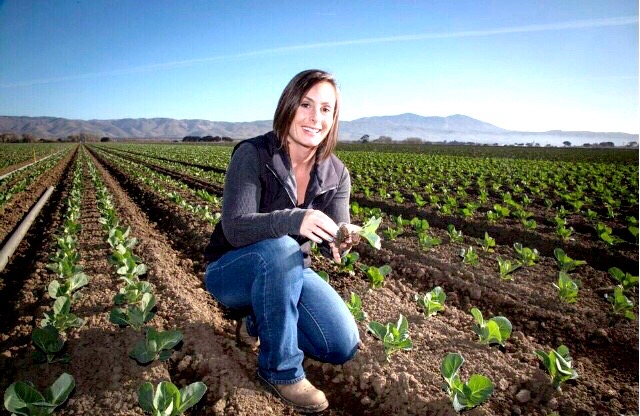Colby Pereira has been serving in the Monterey County Farm Bureau since shortly after college.
At the annual meeting for the California Farm Bureau Federation in Monterey on Monday Pereira spoke with Agri-Pulse about the recent romaine outbreak traced back to the region as well as water quality and quantity challenges.
Pereira is in her fourth year as president and also serves on the board of the Grower-Shipper Association of Central California, while managing the family farm.
1. How do you typically describe agriculture in this region?
The way I like to describe local agriculture, especially in Monterey County, is when you sit down at the dinner table, take an account of what's sitting around you. Chances are that we’ve produced any of what you're seeing in Monterey County in some way, shape or form.
The salad was probably grown there. We have a lot of beef. We probably produced the wine. We’re not so much on the dairy side of things, but everything else.
We are pretty invested in Monterey County.
2. What have been the top issues for you this year?
Food Safety. I'll mention that one first, just because it's on everybody's minds with this latest romaine E.coli outbreak.
That's something that we're always working through. Even when it's not in the news, local farmers are always doing their best to grow safe, healthy, nutritious products. Even when you're not reading about it, we're still working really hard on it.
This past year, the (Leafy Greens Marketing Agreement) – of which I serve on the technical committee – went through a whole round of looking at our metrics to see how we can improve practices. We depend on science. As new science becomes available, we change our practices to reflect the new things we're learning
We looked at our water metrics and made a couple changes in terms of how often we're testing and how we're testing our water.
It's heartbreaking. We do the best we can, and we follow the best science practices available. Unfortunately, we still end up with an issue like this. Obviously, public health is our top concern, and we're working through it to keep getting better.
Labor and immigration is another big one. I know the government's working on the Farm Worker Modernization Act right now. We're really hopeful we can get some movement on the immigration front.
It's twofold. When you look at our labor situation, not only do we need to do something for our existing labor force that's already here working diligently but allowing for what we are going to do for the future needs. There's a lot of technology coming about and a lot of mechanization, but they can't do it all. So we're still going to be heavily dependent on a future flow of labor.
3. What else do you expect to be working on in 2020?
Groundwater is the big one. We're working on implementing (the Sustainable Groundwater Management Act) here locally.
One of our basins is on the 2020 deadline for SGMA. We have to have our plans actually approved by January of next year. We're working really hard on that, and we'll have a few other subbasins that will be not too far behind it.
We’re also looking at our Irrigated Lands Regulatory Program with surface water. We're making a lot of progress. We’re working on a lot of research surrounding nitrogen: How much our crops need; how much we're currently applying; how that all factors into long-term use of nitrogen; and how the relationship between that practice and our groundwater is affected.
4. With food safety, are there any messages that are not getting heard and you feel should be?
I'm going to put my consumer hat on. It's so important that we still consume all of our fresh fruits and vegetables. I'm convinced that farmers are growing the best medicine available to consumers. At the end of the day, it's safe, it's nutritious, it's healthy. Please continue eating it.
5. What issues are you facing with housing and the urban-rural divide?
In terms of housing, it's a really important topic here on the Central Coast. The entire state is facing housing issues.
We're really getting hit hard. There is not affordable housing available for our community and then especially for our workforce. We're working hard here in Monterey County to interface with our local electeds and then to also carry that message to Sacramento. It’s important to streamline processes for getting housing built, whether it's workforce housing or low- or medium-income help – all levels of housing need to be built.
Top photo: Colby Pereira delivers the welcoming remarks Monday for the California Farm Bureau Federation Annual Meeting in Monterey. (Photo: CFBF)


